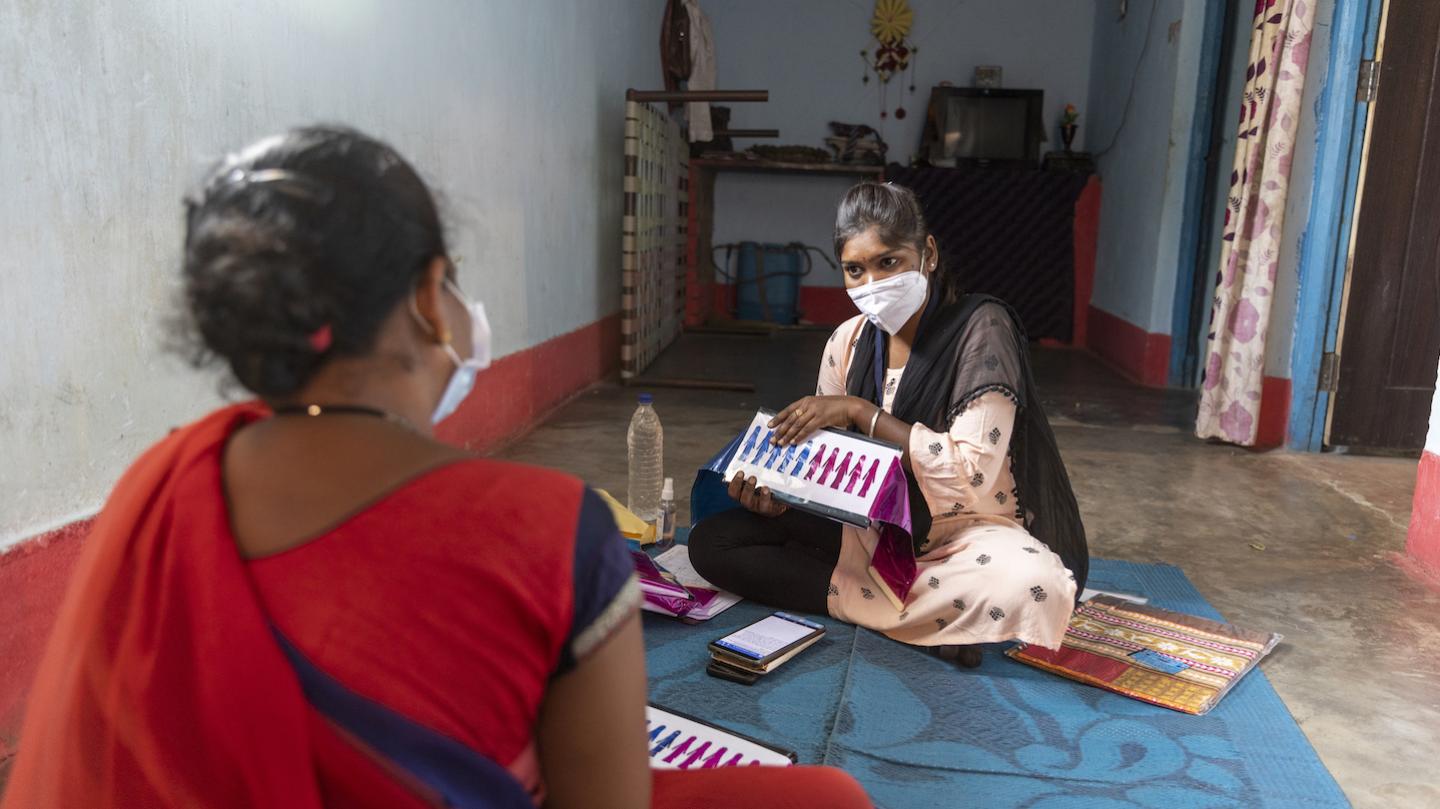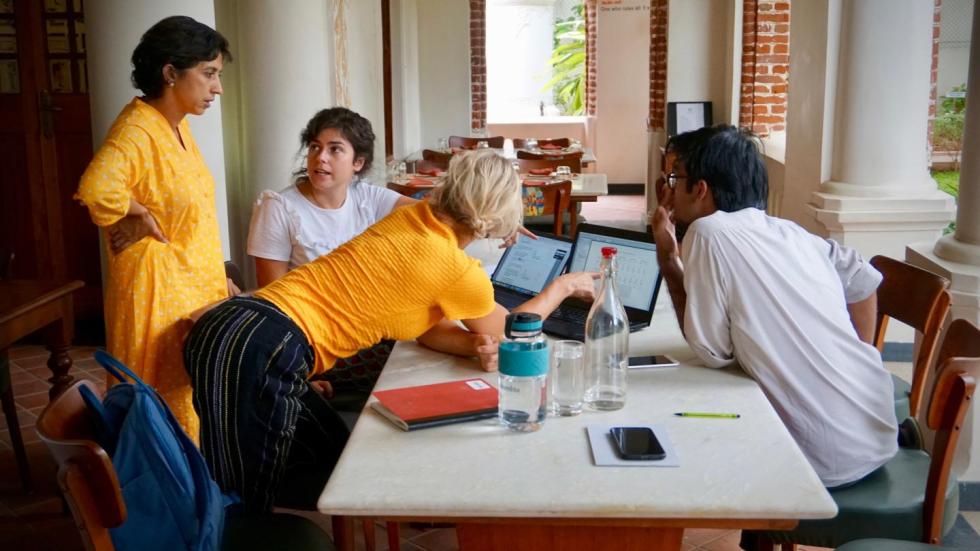Upcoming Events
Speakers for the series this year include:
September Brown Bag: "Can biometric verification get more cash to poor women? Evidence from Pakistan"
By Kate Vyborny, joint with Amen Jalal and Muhammad Haseeb
Join us on September 13th for a talk with Kate Vyborny, Research Scientist at the Duke University Department of Economics & Associate Director of DevLab.
Abstract: Many countries target low-income women for cash transfer programs but struggle to ensure that female beneficiaries personally receive and retain control over these funds. Biometric verification may address this issue by requiring beneficiaries to personally withdraw funds after authenticating their fingerprints. While this may reduce unauthorized withdrawals and capture of funds by other household members, it may also increase time and money costs of withdrawal and cause unintended exclusion of eligible beneficiaries. We exploit the staggered rollout of biometric identity verification in Pakistan’s Benazir Income Support Programme to assess its impact on the delivery of cash to low-income women and downstream effects on women's wellbeing and empowerment.
October Brown Bag: "Labor Market Response to Gendered Breadwinner Norms: Evidence from India"
By Sakshi Gupta
Join us on October 11th for a talk with Sakshi Gupta, Ph.D. student in Columbia University's Department of Economics.
Abstract: Over the past few decades, Indian women have become more educated and have gained greater control over their fertility decisions, but, unlike the western experience, this has not led to increased participation in the labor market. I examine the role played by the male breadwinner norm in explaining this puzzle. I first establish a sharp discontinuity in the distribution of the share of the wife’s income in the total household income where the wife’s income exceeds the husband’s income. The size of this discontinuity is much larger than that observed in developed countries like the U.S. I show that this pattern can be best explained by gender identity norms that make couples averse to situations where the wife earns more than her husband. I do so by interpreting the male breadwinner norm as a notch in household preferences which results in this kind of aversion. Moreover, I show that this aversion has real implications on the labor market decisions of the wife. First, she is less likely to participate in market activities if her potential income is likely to exceed her husband’s. Second, she earns less than her potential if she does work and can potentially out-earn her husband. I observe that this phenomenon is more pronounced in couples where husbands are making the labor market decisions of their wives and in households that follow other regressive gender norms suggesting backlash.
November Brown Bag: "Rebel With a Cause: Impact of a Gender Norms Training on Young Adolescents in Somalia"
By Sreelakshmi Papineni, joint with Rajdev Brar, Niklas Buehren, and Munshi Sulaiman
Join us on November 8th for a talk with Sreelakshmi Papineni, Economist at the World Bank Gender Innovation Lab.
Abstract: This paper uses a randomized controlled trial to evaluate the impact of a gender norms training program to young adolescents (aged 10 to 14 years) in Somalia. In addition to self-reported gender attitudes and behaviors, the paper leverages novel lab-in-the field experimental games designed to examine observed behaviors, such as outcomes related to leadership and social conformity. To examine conformity, adolescents were asked to report their gender beliefs in private, and in public while randomly positioned with a group of peers. The paper finds that the program leads to an increase in the gender equitable attitudes of both adolescent girls and boys; and importantly to greater non-conformist behavior when stating their gender beliefs in public in a lab setting. Trained adolescents also report improved mental health outcomes where they face less emotional and behavioral problems and show more caring behavior towards siblings of the opposite sex. The paper provides weak evidence of trained boys increasing their involvement in domestic chores, relative to a control group. The paper also finds limited marginal impact on adolescent outcomes of a complementary gender norms training delivered to parents. The results highlight the potential for programs that raise awareness of societal expectations that create conformity and enable gender inequality.
December Brown Bag: "Mind the Data Gaps: An Examination of Women-Owned Enterprise Representation"
By Morgan Hardy
Join us on December 13th for a talk with Morgan Hardy, Assistant Professor of Economics at New York University Abu Dhabi.
Abstract: Using data from 43 countries in Sub-Saharan Africa, we document large variations in women-owned enterprise representation and estimates of gender gaps in enterprise performance between commonly available data sources. We provide empirical evidence that these differences are driven by variations in gender-blind sampling protocols. Women-owned enterprises are less likely to meet the sampling criteria for most widely available enterprise data and those that do are more positively selected on performance, relative to male-owned enterprises. We document differences in implied policy and research priorities; sources with higher women-owned enterprise representation point toward issues of market access, over more commonly studied barriers.
January Brown Bag: "The Effects of Childcare on Women and Children: Evidence from a Randomized Evaluation in Burkina Faso"
By Estelle Koussoubé
Join us on January 10th for a talk with Estelle Koussoubé, Economist at the World Bank’s Africa Gender Innovation Lab.
Abstract: This paper studies whether providing affordable childcare improves women's economic empowerment and child development, using data from a sample of 1,990 women participating in a public works program in Burkina Faso. Of 36 urban work sites, 18 were randomly selected to receive community-based childcare centers. One in four women who were offered the centers used them, tripling childcare center usage for children aged 0 to 6 years. Women's employment and financial outcomes improved. Additionally, child development scores increased. However, the analysis finds no significant effects on women's decision-making autonomy, gender attitudes, or intrahousehold dynamics, suggesting the importance of considering multiple dimensions of childcare impacts.
February Brown Bag: "Are gender norms systematic to caste institutions? Examining preferences through a social experiment in India"
By Aparajita Dasgupta
Join us on February 14th for a talk with Aparajita Dasgupta, Assistant Professor of Economics at Ashoka University.
Abstract: In this paper we examine how traditional institutions like caste interact with socio-economic status to mediate the perception of gender roles and attitudes around female labour force participation. We use third party vignettes to directly test the validity of the hypothesis that lower castes have more egalitarian gender norms and lower acceptance of restrictions on female autonomy. We find that the relationship between conservative gender norms and caste are in turn influenced by the class status of households, measured by land or asset ownership. Lastly, we conduct a simple social experiment to test for `pluralistic ignorance' and confirm the presence of systematic overestimation of conservative attitude that varies by caste and class identities.
March Brown Bag: "Sexual Harassment in Public Spaces and Police Patrolling: Experimental Evidence from Urban India"
By Maria Micaela Sviatschi
Join us on March 14th for a talk with Maria Micaela Sviatschi, Assistant Professor in Economics and Public Affairs at Princeton University.
Abstract: We implement a randomized controlled trial to evaluate the impact of a street patrolling program targeting sexual harassment in public space on women’s victimization in Hyderabad, India. Using a novel high-frequency observation exercise to collect measures of sexual harassment at 350 hotspots, we show that visible police presence reduces severe forms of sexual harassment by 27 percent and thus, improves women’s mobility behavior. In particular, we find that women are less likely to avoiding a particular street to prevent sexual harassment. To explain the null effects on mild forms of sexual harassment, we exploit heterogeneity in police officers’ attitudes towards sexual harassment and design an artefactual field experiment to understand police behavior and biases. We find that, on average, police officers’ tolerance and willingness to sanction are lower for mild forms of sexual harassment. In line with this result, we find a reduction in less severe cases of sexual harassment only when the assigned police officers have better norms surrounding sexual harassment cases. Overall, addressing sexual harassment in urban places through the lens of policing poses a significant challenge due to the nature of the crime and police officers’ potential biases.
April Brown Bag: "Tipples and Quarrels: The Effect of an Alcohol Mitigation Intervention on Intimate Partner Violence"
By Carolina Castilla
Join us on April 11th for a talk with Carolina Castilla, Richard M. Kessler Professor of Economics Studies and Associate Professor of Economics, Colgate University; Adjunct Associate Professor at Cornell Dyson School.
Abstract: Alcohol abuse and intimate partner violence (IPV) coexist in many households. We estimate the causal effect of a randomized-control trial designed to mitigate alcohol consumption on IPV in rural Kenya, where IPV rates are higher than the global and national average. The intervention consisted on treated households attending a series of workshops and couples’ therapy sessions. Non-treated households in close proximity may benefit from treatment spillovers, and are part of a spillover control group, while pure control households were in separate villages. Treatment substantially lowered prevalence of sexual IPV, with smaller or no effects on physical and emotional IPV. Incidence of sexual violence decreased by 0.21 standard deviations relative to the control mean. At the intensive margin, we find that the frequency of sexual violence decreased by 0.19 standard deviations from the control, while physical violence decreased by 0.16. Interestingly, men were also 10 percentage points less likely to agree that wife-beating is justified when a wife refuses sex. Counselor notes from treatment sessions reveal that alcohol abuse and IPV were commonly mentioned together by couples, suggesting a program to lower alcohol abuse may reduce IPV as well.
May Brown Bag: "The Economics of Caste Norms: Purity, Status, and Women's Work in India"
By Patrick Agte and Arielle Bernhardt
Join us on May 9th for a talk with Patrick Agte, a PhD student at Princeton University, and Arielle Bernhardt, a PhD student at Harvard University.
Abstract: Caste norms, the religious and social rules that underpin the Hindu caste system, impose strong constraints on behavior: women should stay secluded within the home, caste groups should stay segregated, and certain foods should not be eaten. This paper shows that caste norms are weakened when Hindus live alongside Adivasis, an indigenous minority outside of the caste system. Using a number of estimation strategies, including a historical natural experiment that led to local variation in Adivasi population share, we show that having more Adivasi neighbors decreases Hindus’ adherence to a wide range of caste rules. Hindu women in Adivasi-majority villages are 50% more likely to work and have substantially higher earnings. Individuals higher on the caste hierarchy are less likely to practice “untouchability” towards those lower than them and villages are more likely to be integrated. We argue that Hindus adhere to caste norms as an investment in status within the caste system, and that this investment is less valuable when Adivasis—a lower-status out-group—form a larger share of the village population. Consistent with this explanation, caste norms are weaker in areas where British colonial policy led Adivasis to hold more land and political power, increasing the returns to social and economic interactions with Adivasis independent of their population share.

